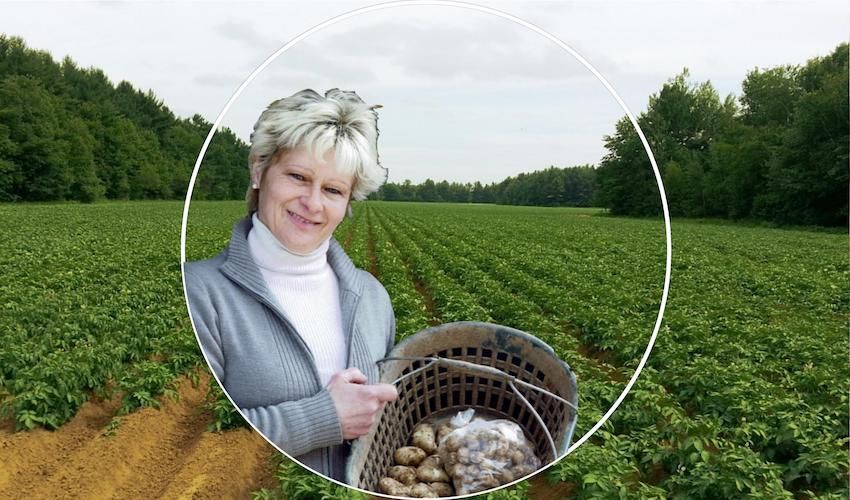

Increasing the minimum wage is going to hit farming the hardest, a local vegetable farmer has said in a rallying call for help in cultivating a stable workforce for what was once Jersey's key industry.
In a plea for policymakers to consider the unique demands of farming, Christine Hellio, who runs Manor Farm in St. Ouen with husband Didier, has spoken out about the urgent struggles facing farming.
Amid a farming recruitment crisis, non-negotiable demands from UK supermarket chains and the constant struggle to retain seasonal workers, her latest concern comes in the form of a recommendation from the Employment Forum for the highest increase to the minimum wage in a decade, which would see all employees over 16 given at least £8 an hour - regardless of industry.
Mrs Hellio made it clear that whilst an increase in the minimum wage is needed for workers in the retail sector who need to meet rent payments, she explained that farmhands have lower expenses as they often live on site.

Pictured: Christine and Didier Hellio's farm, which grows Jersey Royals and other vegetables, also houses its workers on-site.
Mrs Hellio told Express that all her workers are put up in accommodation on the farm which is fully furnished and if any maintenance or repairs are needed, she and her husband cover those costs.
In making their wage hike recommendation, the Forum acknowledged that the increase, which would see an extra £1,000 a year for low-paid workers, could be "challenging" for agriculture, they said that a two-part transition to the higher level of pay - 5% from the beginning of April next year and then 1.8% in October - would help this.
But Ms Hellio said that this didn't allay her concerns.
“I don’t really think it will make a difference," she said, adding that the problem posed by increasing farmers’ expenses is more about the relationship between Jersey farms and UK supermarkets which mean that farmers will have to swallow the extra costs.

Pictured: Helen Ruelle, Chair of the Employment Forum, says that there is "little evidence" to support claims of job losses after the latest minimum wage hike.
Mrs Hellio told Express: “85-90% of the new potatoes that are grown in Jersey are exported out to supermarkets in England. Those supermarkets are already deciding what they are going to be paying for those potatoes for next year… those prices are already arranged.”
Mrs Hellio explained that, as a farmer, she is not in a position to ask for more money from the supermarkets to cover her increased expenses. “These supermarkets are very powerful – they are in charge. It’s non-negotiable."
“If the supermarkets in the UK won’t give me more money for my potatoes then I don’t know if I could afford to employ the amount of people that I’m employing – I would have to scale down my farm. Everybody would have to go that bit smaller I think.”
The further expense posed by the minimum wage hike is just another reason why Mrs Hellio is concerned for the future of her industry, she told Express that the minimum wage is just one example of how blanket States’ policies don’t cater to the specific needs of the agricultural industry.

Pictured: The Hellios are going into their 32nd year of business on Manor Farm together, but they say their future as farmers is hanging in the balance.
For Mrs Hellio, the fact that seasonal workers have to pay £80 for their registration cards as well as their income tax rocketing after the first few years are all contributing factors in the farming sector’s struggle to retain workers long-term.
The vegetable farmer continued: “We all want our staff to stay and to stay with us for the long-term, because it actually takes two years to train somebody up properly. In farming, as seasons change really quickly so you do need workers to really know what they’re doing. What we’re looking for is people that come and that stay.
“We need staff that are going to be happy and are going to see the benefits of coming here and at the moment, the way that the States are with ITIS, with the registration card, with the social security, there is no point in them coming.”
Mrs Hellio, who has been farming since she had to leave school at the age of 14 to help on her parents’ farm and has been working on Manor Farm with her husband for 32 years, is seriously concerned that the industry could be in its twilight years.
“I know we can’t have one rule for one and one rule for the others, but there are certain needs which are not met to help the farmers. Otherwise, I don’t see where farming is going to be left.
"It’s not a case of saying agriculture needs more freebies. I want a solution, not a money-injection.”
Comments
Comments on this story express the views of the commentator only, not Bailiwick Publishing. We are unable to guarantee the accuracy of any of those comments.